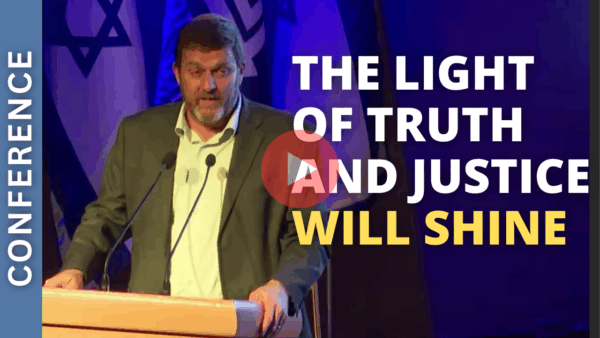In recognizing a state committed to eliminating another state, these champions of international law figure that they have outsmarted the Israelis.
The announcement was made to great acclaim, greeted with the attention reserved for events destined for the history books. The “Quartet,” as it was known—made up of the European Union, Russia, the United Nations and the United States—had finally done it. They had recognized a Palestinian state.
The name of the initiative was the “Roadmap for Peace.” The year was 2003.
“We have reached a hopeful moment for progress toward the vision of Middle Eastern peace,” then-President George W. Bush said in the White House Rose Garden. A day in which “two states, Israel and Palestine, will live side by side in peace and security.”
It took some doing, but after pressure from Washington, the government of then-Israeli Prime Minister Ariel Sharon also fell into line. Following a narrow 7-5 vote in the cabinet, the State of Israel joined the Quartet and issued “an unequivocal statement affirming its commitment to the two-state vision of an independent, viable, sovereign, Palestinian state.” At the time, Benjamin Netanyahu, now Israel’s prime minister, was the country’s finance minister.
But there was a condition. Before the Palestinians could claim their state, they first were required to “reiterate Israel’s right to exist in peace and security” and call for “an immediate end to all acts of violence against Israelis anywhere.”
The rest of the story you probably already know. Palestinians never recognized Israel, never ended the violence and never achieved statehood. The roadmap, however, was hardly a fool’s errand. It laid bare to all who could be convinced why there is no Palestinian state. And it provides an important background to the diplomatic outrage that will soon be carried out by Britain, France, Canada, Australia and others.

Why? These nations are recognizing a Palestinian state, but they aren’t conditioning it on any reciprocal commitment by Palestinians to live in peace. There are statements requiring Hamas to be excluded from governance (all while calling for an end to the Israeli military operation that offers the only pathway to their exclusion). But none has stipulated the most basic requirement for a two-state solution, namely that the Palestinians agree to the legitimacy of a Jewish state. British Prime Minister Keir Starmer merely referred to “reform of the Palestinian Authority,” as if peace can be achieved by appointing an ombudsman.
In short, the rush to recognize a Palestinian state is indeed “unprecedented,” just not for any of the reasons being offered by its supporters. Starmer, French President Emmanuel Macron, Australian Prime Minister Anthony Albanese and Canadian Prime Minister Mark Carney could have conditioned the recognition on Palestinians agreeing to live in peace. But that conditional recognition was extended more than 20 years ago and would only serve to highlight why there is still no Palestinian state.
In other words, that recognition wouldn’t hurt Israel. So instead, they did something that is indeed unprecedented: They recognized a state that is committed to the destruction of another state. The public seems to have seen right through this. According to polling, nearly nine in 10 Britons do not back Starmer’s maneuver.
The true nature of this farce will soon become apparent. In recognizing a state committed to eliminating another state, these champions of law figure that they have outsmarted the Israelis. However, they have also outsmarted themselves. Under international law, states cannot be recognized merely as a statement of protest. To be a state, an entity must meet certain criteria. Central to this is the requirement that the “state” control territory.
By recognizing Palestine, the recognizers are saying in effect that the Palestinian Authority is in control of the West Bank and Gaza. That means that they are no longer under Israeli occupation, which, again, under the plain terms of international law, means that Israel no longer has any obligations to maintain the health, safety and well-being of the Palestinians. Hopefully, someone will remind them of this the next time they demand that Israel supply the Palestinians with more water and electricity. How they reconcile Israel as an occupier over land the Palestinians control is anyone’s guess.
Supporters of recognition say they are merely trying to free the hostages and end the war. If that were the case, then they could have conditioned recognition on Hamas freeing the hostages and ending the war. In other words, they could have made Hamas the obstacle to recognition rather than its facilitator. Shockingly, Starmer did the opposite, threatening recognition unless Israel agreed to a ceasefire. Hamas was therefore incentivized to refuse any deal to end the war.
The outcome was predictable. Hamas is proclaiming victory, while the Israelis are lamenting the prize being given to terror. This is no way to bring hostages home. And it’s no way to create a two-state solution.

